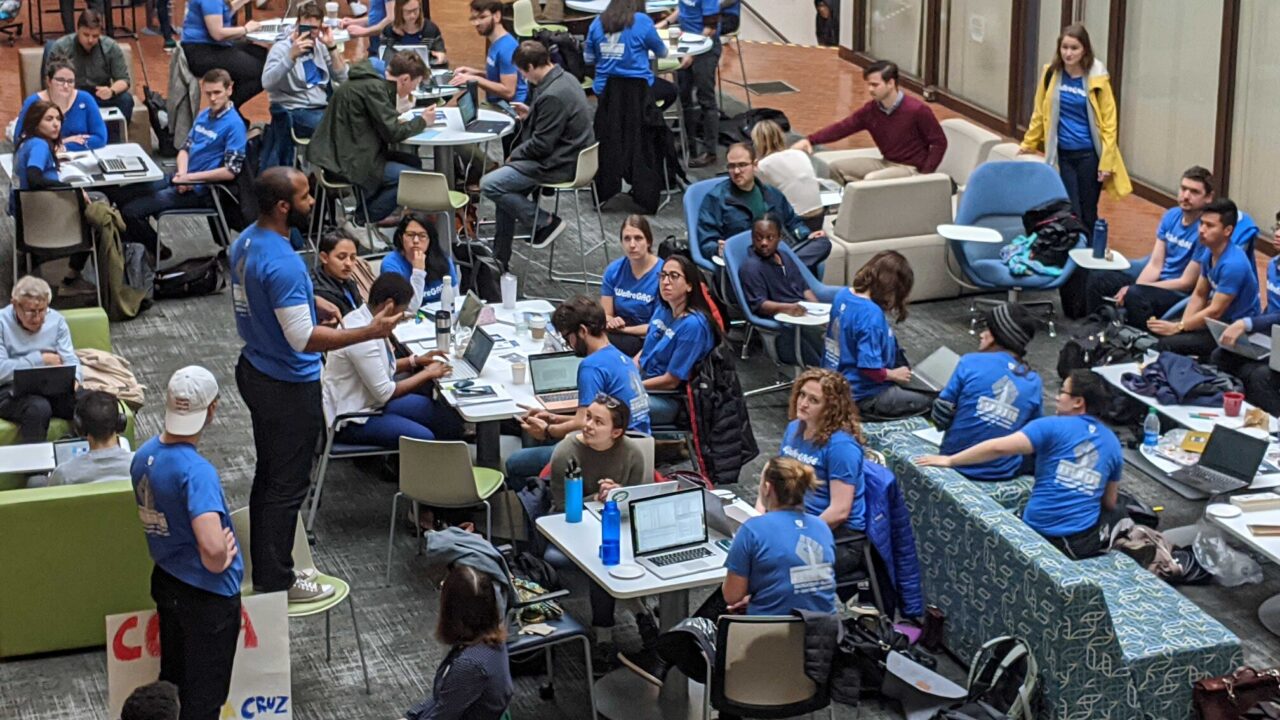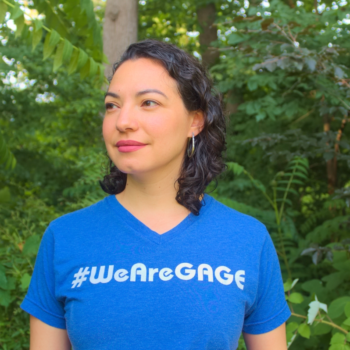For most graduate students at Georgetown University, the experience of graduate work is characterized by financial stress and precarity. A typical graduate student at Georgetown spends nearly their entire pay on housing and necessities or takes on debt to make ends meet, all while performing the essential functions of teaching undergraduates and conducting research on the University’s behalf. The high cost of living in Washington, DC, leads many graduate workers to skip meals and delay healthcare to make rent — a toll on our health and well-being that has only worsened amid the ongoing COVID-19 pandemic. That’s why graduate workers like us decided in 2017 to organize our union, the Georgetown Alliance of Graduate Employees (GAGE), to remedy the precarity of this experience through collective bargaining.
On May 1, 2020, we reached our first contract agreement with the Georgetown administration. Among many protections and benefits, the contract raises pay for all graduate workers, expands paid medical and family leave, and guarantees dental insurance coverage at no expense to PhD students. We reached this agreement despite important local and national obstacles to labor organizing: not only the continued threat that the National Labor Relations Board would redefine graduate workers as students-only, with no right to collective bargaining, but also the new organizing challenge posed by COVID-19. Georgetown closed down in the final months of contract negotiations and began instituting austerity measures to address the anticipated global economic downturn. Any contract victory is hard fought and well won; the pandemic context has made ours especially so.
We began our negotiations around pay, healthcare, and other economic issues on the cusp of the pandemic in March 2020. The administration pleaded poverty: they had issued partial refunds for housing and tuition for some undergraduates and had started to wring their hands about the effects of our current economic recession on their ability to meet graduate workers’ needs. The University’s economic anxiety forced us to consider difficult choices that we hadn’t expected to make: should we push on wages or for better benefits? Should we postpone some gains for our next contract? At the same time as we deliberated on these issues internally, we used our public platforms to highlight the disparity between the seven-figure compensation that senior university officials continue to draw and the material struggles of graduate workers.
A steady pace of organizing around the activity at the negotiating table was central to our contract victory. At key moments throughout our bargaining session, we “filled the room” to communicate to the administration our members’ willingness to fight for a fair contract. During our March 3rd session — the second-to-last before shelter-in-place orders set in — our members were spilling into the hallway. We kept up the pace of attendance as the sessions turned remote: 60 members attended our final bargaining session. Member participation required the slow work of building and activating relationships with both longstanding and new members. We quickly realized that there was no alternative to this deliberate relationship-building. In addition to our email blasts and posts on Twitter, Facebook, and Instagram, we organized weekly phone-banking sessions to turn out members to these bargaining sessions and encourage them to share their experiences at the table. These phone-banking sessions substituted for the “department walkthroughs” that our organizers typically use to talk to members on campus.
While every campus provides unique opportunities and challenges for graduate-worker organizing, ours bore out one of the truths of labor politics: the collective power that our membership showed the university through in-person organizing and online activism was central to our success.
Lessons Learned
With the benefit of hindsight, we have identified three lessons from GAGE’s contract victory.
Frame your contract campaign around values that resonate with the university.
All universities seek to shape public opinion through formal mission statements, values, and traditions designed to influence their reputation and societal standing. Georgetown proudly centers its identity as a Jesuit institution and integrates Jesuit values into nearly every aspect of university culture, from undergraduate curriculum to campus decor. In particular, Georgetown trumpets the Jesuit value Cura Personalis, which it interprets to mean “profound care and responsibility for one another, grounded in individualized attention to the needs of the other … to encourage each person’s flourishing.”
Throughout our contract campaign, we emphasized how our goals aligned with Jesuit values while the Georgetown administration’s treatment of graduate workers fell short of the University’s purported values. We launched our contract campaign with a membership pledge stating that our goal was to win “a contract for the whole person so that all of us can thrive” — which we fondly referred to as “Contract Personalis.” Our pledge implied that our contract was the solution to the administration’s failure to uphold its Jesuit values. This framing was useful in statements and arguments at the bargaining table, but it was most influential in strengthening support among our membership. The “Contract Personalis” theme allowed members to see a common cause in their multiple, varied concerns. What had been separate domains of healthcare, food insecurity, and financial precarity became surmountable obstacles to their ability to thrive as graduate workers at Georgetown.
Prior to the pandemic, we encouraged members to show up to bargaining sessions and “THRIVE”-themed rallies, work-ins, and protests. The onset of the pandemic required that we shift our shows-of-force to the new, socially-distanced world: In the final weeks of negotiations, while we struggled with the administration over compensation and benefits at the table, we used social media to share written stories from members who experienced chronic hunger, homelessness, and other hardships to illustrate how insufficient graduate stipends and benefits transformed Cura Personalis into “Cura Personalis for those who can afford it.” As a final action, dozens of GAGE organizers sent emails to members of the University’s Board of Regents, urging them to ask the administration to adhere to Jesuit values by agreeing to our contract for the whole person. These emails accompanied a “drive-by protest” through the gated community of Georgetown’s president, Jack DeGioia.
Framing our contract campaign around Georgetown’s professed values moved our membership to action and garnered support for our efforts within the broader Georgetown community. This frame made clear that we were organizing to improve the material conditions of all graduate workers, across a range of different concerns. It allowed members to see the solutions to their precarity in the possibility of a contract — and the urgency of organizing to win it.
Center the bargaining process on your members’ lived experience.
Our personal experiences as workers motivated us to organize a graduate union and drove us to fight for a collective bargaining agreement. During the bargaining process, we began meetings with the administration with testimonies from GAGE members. These stories emphasized how the proposal we were discussing was critical for addressing the precarity that graduate workers experienced. The lived experiences of our members inspired our contract proposals, and we took every opportunity to make this fact apparent at the bargaining table.
When we introduced our proposals to expand paid medical and family leave, for example, Georgetown administrators heard for themselves the struggles that resulted from the University’s restrictive policies: PhD students who should have been recovering from surgery teaching on campus, or PhD students who lost teaching assistantships because they returned home to care for an ill parent. When the administration attempted to frame medical and family leave in terms of the University’s bottom line, our bargaining team used our members’ stories to ground the discussions in concrete impacts on people’s lives.
Solidarity matters.
Throughout the bargaining process, we called on graduate unions at Georgetown’s peer institutions, including private universities and other religiously-affiliated institutions, as well as Georgetown students, alumnae, faculty, and other workers, to speak out in support of the contract campaign. We also worked with other unions on Georgetown’s campus; at a rally at the end of the Fall 2019 semester, a member of Georgetown’s adjunct faculty union addressed GAGE members about the importance of solidarity for our common efforts. Universities like Georgetown spend time and money to ensure that they stay in good standing with these external and internal constituencies. Ensuring that we had a steady barrage of public expressions of solidarity from these members of peer institutions and networks, including via social media, allowed those of us at the table to raise the effects of the University’s treatment of graduate workers on Georgetown’s public reputation.
In the final days of our negotiations, we coordinated a solidarity petition drive that highlighted external support for our campaign. The petition called on Georgetown’s president John J. DeGioia to ensure that a contract agreement was reached by the end of the academic year and asserted the value of graduate labor for the University’s reputation. Over three hundred Georgetown faculty, staff, alumni, and student groups, as well as our members’ families and friends, signed onto the solidarity petition. This demonstrated to Georgetown administrators that our message and support reached beyond our membership and impacted their reputation with key constituencies.
Concluding Thoughts
Our union siblings across the United States have also seen important labor victories since the beginning of the COVID-19 pandemic. Brown University’s graduate union, Stand Up for Graduate Student Employees (SUGSE-AFT), won a contract that includes a pay raise and guarantees an additional year of funding for advanced PhD students whose work the pandemic has interrupted. Following a tireless battle that included a strike last fall, the new Harvard Graduate Students Union (HGSU-UAW) contract includes a pay raise and subsidies for health- and childcare costs.
The coming academic year will present new organizing challenges for graduate workers across the United States, as universities weigh whether to re-open on-campus instruction and research in the middle of a worsening pandemic, potentially putting the health, safety, and financial well-being of graduate assistants and other precarious campus workers at risk. These three strategies — resonant framing, centering our members’ lived experiences, and pursuing solidarity from internal and external allies — were the core of our contract campaign, and we are reviving them in the context of our ongoing organizing to protect our members from the University’s reopening plans. Although our contract campaign has concluded, the urgency of organizing never ceases.


